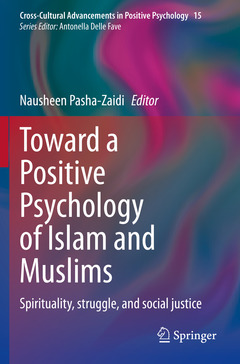Toward a Positive Psychology of Islam and Muslims , 1st ed. 2021 Spirituality, struggle, and social justice Cross-Cultural Advancements in Positive Psychology Series, Vol. 15
Coordonnateur : Pasha-Zaidi Nausheen

It fills a unique position at the crossroad of multiple social science disciplines, including the psychology of religion, cultural psychology, and positive psychology. By focusing on the ways in which spirituality, struggle, and social justice can lead to purpose, hope, and a meaningful life, the book contributes to scholarship within the second wave of positive psychology (PP 2.0) that aims to illustrate a balance between positive and negative aspects of human experience. While geared towards students, researchers, and academic scholars of psychology, culture, and religious studies, particularly Muslim studies, this book is also useful for general audiences who are interested in learning about the diversity of Islam and Muslims through a research-based social science approach.
Part I - Designing and Doing Research
Chapter 2: Spiritual Assessment: Building Positive Resources for the Distressed Souls
Rabia Dasti, Dr. Aisha Sitwat, and Amna Anwaar
Chapter 3: Research with American Muslim Communities
Munir Shah and Nasreen Shah
Chapter 4: Thoughts on the GCC National Research Context: Challenges to Developing a Local Psychology
Louise Lambert, Saad Ibrahim Yaaqeib, Annie Crookes, Brettjet Cody, & Semma Saad
Part II - Connecting Secular and Islamic Perspectives
Chapter 5: Islamic Psychology and Wellbeing: Bridging Western and Eastern Worldviews
Syed Rizvi
Chapter 6: Ways of Knowing and Being: Theoretical Sufism of Ibn ‘Arabi & C. G. Jung’s Psychology
Mansoor Abidi
Chapter 7: The Contribution of Psychoanalysis to a Positive Islamic Psychology
Beyhan Bozkurt and Nausheen Pasha-Zaidi
Part III - From Being to Wellbeing: Approaches to Health and Healing
Chapter 8: Islamically-Informed Principles of Psychotherapy with Muslim American ClientsNasreen Shah
Chapter 9: Finding Meaning in a Meaningless World: An Existential Focus of Islamic Psychology
Syed Rizvi
Chapter 10: The Heart of Autism: Building A Positive Islamic Model of Cognitive Disability
Laila S. Dahan
Part IV - Social Justice and Community Building
Chapter 11: Socially Engaged Islam: Applying Social Psychological Principles to Social Justice, Faith-Based Activism and Extreme Altruism in Muslim Societies
Anisah Bagasra
Chapter 12: Decolonizing Muslim Same-Sex Relations: Reframing Queerness as Gender Flexibility to Build Positive Relationships in Muslim Communities
Sarah Shah, Maryam Khan, and Sara Abdel-Latif
Chapter 13: Afghan Hazara Asylum Seekers in Athens: Positive Affirmation through Service and Protest
Melissa Kerr Chiovenda
Chapter 14: The Struggle of Chosen Identity Amongst Uyghurs While Living Under the Chinese State
Kamla Hsin Tung
Part IV - Islamic Feminism, Gender and Sexuality
Chapter 15: Working towards a Positive Islamic Identity for Muslim American Women
Tasneem Mandviwala
Chapter 16: Sexually Diverse Muslim Women Converts: Where Do They Stand?Maryam Khan
Chapter 17: Muslim Media Psychology and its Effects on Society: The Role of Pakistani TV Serials in Promoting Women’s Rights
Iqra Iqbal and Nausheen Pasha-Zaidi
Integrates Islamic psychology, Muslim mental health, and positive psychology in one volume
Highlights diverse voices of minoritized Muslims from a strengths-based perspective
Looks at the wellbeing of diverse Muslims through positive psychology 2.0
Date de parution : 07-2022
Ouvrage de 416 p.
15.5x23.5 cm
Disponible chez l'éditeur (délai d'approvisionnement : 15 jours).
Prix indicatif 147,69 €
Ajouter au panierDate de parution : 07-2021
Ouvrage de 416 p.
15.5x23.5 cm
Disponible chez l'éditeur (délai d'approvisionnement : 15 jours).
Prix indicatif 147,69 €
Ajouter au panier


